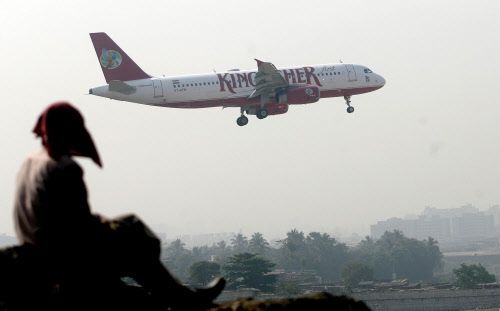
New Delhi, October 25: In a breakthrough for the beleaguered Kingfisher Airlines, its pilots, and then some time later its engineers, who had been on strike since last month, today accepted the management's offer of three months' salary, paid in tranches by Diwali, 13 November. They will all report to work today.
The pilots will have to undergo simulator training and route checks again (since they have not flown for 30 days), and the process will take about a week. Aircraft checks, too, will take a couple of days.
"All employees have agreed to resume duty right now. They are on duty as we speak ... We are all in this together and looking forward to getting the airline going in the next few weeks," CEO Sanjay Aggarwal told reporters today.
The formula that the employees have reportedly accepted is that the airline will first pay the three months' salary by Diwali and then pay another month's salary by December 16. The rest of their dues will be paid when recapitalization happens or the airline manages a fresh infusion of funds. No Kingfisher employee has been paid salary since March this year.
While the pilots seemed amenable to the offer when it was made a few days ago, the engineers, who are critical to Kingfisher putting its planes back in the air again, had earlier refused the management's offer; they had sought four months' salary, paid in one go, before they came back to work. The news that they too had agreed to call off their 24-day strike came a little after the pilots gave their nod at a meeting with the management in Delhi.
Relief as this is for Kingfisher, it now has other problems to solve before it can fly again. Like convincing the civil aviation regulator, Directorate General of Civil Aviation (DGCA), to reverse a suspension of its flying licence. The DGCA suspended the licence after the debt-laden airline failed to submit a viable revival plan in the stipulated 15 days. The Kingfisher management has said it is readying that revival plan and will submit it by November 6 to the DGCA. It has also said that it hopes to fly again soon, though the DGCA has for now not pencilled its winter schedule in.
Noting that the airline had not yet submitted any revival plan to the DGCA, Civil Aviation Minister Ajit Singh said today, "It is not a question of me being hopeful or not, in my view, it’s a very difficult proposition but not impossible."
Salary, the minister said was a critical issue but is a big issue, but a bigger one was "their fiscal assurance to the DGCA ... They have lot of outstandings to the Airports Authority (of India), to companies, to lessors, so it’s not just a question of salaries to the employees," he said, adding that though Kingfisher's flying license had been suspended, it was "still there but to allow them to fly again, the DGCA has to be satisfied on many more things."
Kingfisher's 250 engineers first went on strike on September 29. The same day, the airline was forced to declare what it called a partial lockout and the next day, grounded its fleet of 10 planes. It has extended its lockout twice since.
Today's meeting was reportedly also a frantic bid by the Kingfisher management to ensure there are no overt protests by Kingfisher employees during the Formula One motor racing to be held in Greater Noida over the weekend. The airline's promoter, Vijay Mallya, co-owns the Sahara Force India team that is participating in the Indian Grand Prix.
About 17 banks—led by the State Bank of India—collectively have an exposure of Rs. 7,500 crore to the airline. The lenders together hold around a 23 per cent stake in the airline since March, after the banks converted their Rs. 6,500 crore of recast debt (after a corporate debt restructuring, or CDR, in November 2010) into equity.





Comments
Add new comment